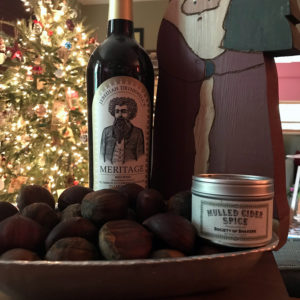SECOND DAY of CHRISTMAS
St. John’s Day
St. John the Evangelist was the only one of Christ’s disciples who did not meet a violent death for his beliefs. While his counterparts were martyred off, one by one, John lived to be an old man. Not that no one tried to get rid of him. There were many attempts on his life, and it is the most famous failed attempt that gives us our tradition for today, the Second Day of Christmas. The story goes that St. John was given poisoned wine, designed to kill him, but it had no effect on the man. And so on his feast day it is customary to bless our wine. In Europe especially, it is traditional to bring wine to church in order for the priest to bless it. This blessed wine is reserved through the year and given as a healing tonic to those who are ill. The blessed St. John’s wine is also thought by many to have a better flavor. And no need to bring all your stores of wine to the church for a blessing; blessed St. John’s wine is said to even confer better flavor on wine that is stored in its vicinity. That’s some powerful stuff.
Whether you have your wine blessed today at church or not, one thing is clear in the spirit of this merry Christmas season: it is a night for wine. In Italy yesterday for St. Stephen’s Day, folks ate roasted chestnuts and drank mulled wine, and tonight, for St. John’s Day, this festivity of the simple bounty of the earth will continue. The wine in Italy for these nights is typically of the mulled sort, spiced with cinnamon and cloves and orange peel. Here’s our recipe:
M U L L E D W I N E
A bottle of good red wine
Mulling spices (a blend of cinnamon, cloves, allspice, orange peel)
Sugar
Pour a quantity (enough for as many people as you are serving) of good red wine into a stainless steel pot and set it on the stove over medium heat. Add about a teaspoon of mulling spices for each serving (we sell some wonderful mulling spices at the Convivio Bookworks website that are from the Sabbathday Lake Shaker Community in Maine… they call it Mulled Cider Mix but it’s just as good in wine). Add sugar: start with a teaspoon or two of sugar and add more to taste. We prefer a less-sweet mulled wine, and while you can always add more sugar, you can’t take it away once it’s in. So my recommendation is to add the sugar gradually, tasting as you go. Heat to allow the spicy flavors to infuse the wine, but do not allow to boil. Strain before serving in cups (not glasses).
Here’s a little something you may find as fascinating as I did when I learnt it one Christmas from the folks at a favorite place of mine, Old Sturbridge Village in Massachusetts: It has to do with our common American expression, “Merry Christmas.” We rarely use the word “merry” other than at Christmas, and yet in England, where the idea of a merry Christmas began, the common greeting at this time of year is “Happy Christmas.” Christmas wasn’t a very big deal in America early on, mainly because the Puritans who settled in New England hated Christmas and made it illegal to celebrate the holiday. They were not fond of all the merriment that went along with a traditional populist Christmas celebration, and so they outright banned its observance. It was Charles Dickens and Washington Irving who really saved Christmas in England and America from extinction, and as Dickens’ Christmas tales grew increasingly popular in the States, folks here began following his texts, wishing a Merry Christmas to everyone they met.
In post-Dickens Victorian England, though, another round of anti-merriment clergy were getting their knickers in a bunch. This time it was the Methodists. They began promoting “Happy Christmas” as a more respectable greeting, more high-brow… and at its essence less merry, less drunken. That took hold in England, and even today, folks there are more likely to wish you a Happy Christmas.
Despite our Puritanical beginnings, “Merry Christmas” reigns here in the States. It is a decidedly secular greeting, less reverential, more festive. On this Second Day of Christmas, we wish you that lovely balance that contains a bit of both. The blessed (or not) wine and chestnuts pave the way, and when we raise our cups to you tonight, we will be wishing you all a Merry Christmas.

Merry Christmas or Happy Christmas? I am satisfied with either sentiment, John.
This holiday season has been so different than what we’ve experienced in past years. We didn’t have friends nor family at our home, we didn’t have the big traditional dinner and we certainly limited our Christmas shopping. I missed seeing all the decorated stores, Santa Claus with the children and the people watching. The possible risks to our health convinced us to limit our activities, but it was a good decision for us.
The new year is almost here. I pray that 2021 will be better for all of us. We’ll see.
Merry, Happy Christmas, Dee! We’ve operated under the same conditions this Christmastime, pretty much have since March, and will continue to do so until things seem more under control. We are getting together with family more, maintaining precautions, but it makes Seth and me anxious each time we do. We will come to brighter days, I’m sure of it. Stay well!
And we will join you in the raising of the glass tonight here in New Jersey! Merry Christmas !
Wonderful! We’ll toast you, too, Kathleen & Carl. Merry Christmas.